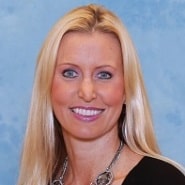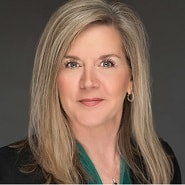
Sarah Richardson, CIO, Calif. Market, Healthcare Partners

Tressa Springmann, VP & CIO, LifeBridge Health

Julie Bonello, CIO, Rush Health
Women and men are inherently different.
Men are better negotiators, more confident, and more likely to take risks. Women, on the other hand, are better team players and are more mission-driven.
We’ve heard these sentiments so many times — and for so long — that they’ve become widely accepted as facts. The reality, according to a Harvard Business Review, is that there are differences between men and women. “But they’re not rooted in fixed gender traits,” it states. “Rather, they stem from organizational structures, company practices, and patterns of interaction that position men and women differently, creating systematically different experiences for them.”
In other words, the reason women occupy fewer leadership roles in fields like healthcare IT is more about nurture, and less about nature. It can be a very discouraging thing to hear. But it also can be inspiring, according to Women in Health IT Leadership panelists, who believe it’s time to move past the (justified) anger many women feel and work to forge change.
Recently we spoke with three influential women about the challenges they’ve faced in their careers, what they consider to be core competencies for female leaders, and why diverse representation is so critical in today’s environment. The panelists — Sarah Richardson, California Market CIO, Healthcare Partners; Julie Bonello, CIO, Rush Health; and Tressa Springmann, CIO, LifeBridge Health — also share their thoughts on how to encourage a healthy work/life balance, how to build a safe culture, why mentoring matters so much, and the discussion that needs to happen on a wider scale.
Chapter 1
- Meet the panelists: Sarah Richardson, Tressa Springmann & Julie Bonello
- Early experiences in leadership
- “Clarification of responsibility is important.”
- Core leadership competency: “Managing awkward situations”
- Transparency in decision-making
- Taking family leave – “It made me a better leader.”
- Encouraging work/life balance
- Family leave policies: “We’ve come a long way.”
LISTEN NOW USING THE PLAYER BELOW OR CLICK HERE TO SUBSCRIBE TO OUR iTUNES PODCAST FEED
Podcast: Play in new window | Download (Duration: 12:06 — 11.1MB)
Subscribe: Apple Podcasts | Spotify | Android | Pandora | iHeartRadio | Podchaser | Podcast Index | Email | TuneIn | RSS
Bold Statements
Developing a sense of humor and learning ways to take the tension out of the situation or out of the room and put others at comfort sadly has become really a valued leadership competency for female leaders.
Make the decision process transparent, because inevitably, you’re going to alienate someone. Somebody will perceive to be losing, so I think having thick skin comes along with the leadership journey.
I know I would never hesitate to walk away from my career to go take care of my family. And I’m grateful that other people appreciate that perspective, because sometimes that’s the role we have. And when we’re honest about it, we get a lot of respect.
We’re continually trying to juggle the work that needs to get done with the work-life balance we need to ensure that our associates have. It’s critical that they have that safety and that ability, when they’re taking care of other things, to not have to worry about the security of their job.
There are life changes that people go through, and I think the more you go through as you progress through your adult life, the more humble you are.
Kate Gamble: Thanks so much to all of you for taking the time to speak with us today for this panel on women in IT leadership. I think we’ll get some really interesting perspectives. Let’s start with introductions — your name, your organization, how long you’ve been there, things like that.
Sarah Richardson: I’m a California market CIO for HealthCare Partners. We are currently a DaVita Medical Group and in the purchase process of going to OptumCare. I’ve been with the organization for about two and a half years. We’re in Southern California; our footprint is about 600,000 patients in a managed care environment both primary and specialty care, mostly in Los Angeles and Orange County. We’ve been around since 1992.
Tressa Springmann: I’m the senior vice president and CIO at LifeBridge Health, a two billion dollar integrated delivery network in the Maryland area.
Julie Bonello: I am the chief information officer for Rush Health. We’re a clinically integrated network with four hospitals and 1,500 providers, serving 500,000 patients in the Greater Chicagoland area.
Gamble: So, there are a few topics I’d like to cover. To start off, when you look at your careers, were there challenges you faced along the way due to being a woman, and if so, how you handle them?
Richardson: I’ll jump in. I have a funny story from my first foray into healthcare, which was at a county hospital in Las Vegas, Nevada, where I was the assistant IT director. My boss was an awesome, very dynamic guy. He always brought me to all his meetings and events so that I would get exposure. One time when I was relatively new, we were at a county meeting. People didn’t really know who I was, and when someone asked, I said, ‘I’m Sarah Richardson, Ernie’s assistant.’ And they asked, ‘Will you be taking the notes today?’ so I said, ‘No, I’m his assistant director. Someone else is going to have to do that.’ There was an assumption of me being a secretary versus his junior executive. That experience taught me that clarification of responsibility is important. But also, the assumption that I was his secretary has always stayed with me.
Springmann: I love direct stories because they’re so representative. Many of us have them and many of them are funny. I think that really speaks to the fact that developing a sense of humor and learning ways to take the tension out of the situation or out of the room and put others at comfort sadly has become really a valued leadership competency for female leaders. Sarah’s story speaks directly to that. I think that having a sense of humor and being able to effectively manage what can be super awkward situations is key, because we’re in an environment right now where I think a lot of females lose opportunities because we have stressed our male colleagues out so much that they’re worried about how to approach us.
Gamble: I’m sure that can be the case. Would you say that you have to have a thick skin?
Springmann: I think when making tough decisions, no matter what your role and no matter what your gender, my personal commitment is to make the decision process transparent, because inevitably, you’re going to alienate someone. Somebody will perceive to be losing, so I think having thick skin comes along with the leadership journey. You need to put that in a box and learn very early if you’re thin-skinned, whether it’s about race, gender, or belief structure. We’re human, and it’s inevitable that it will happen. Sometimes it’s intentional but lots of times it’s unintentional that things that are said will get under your skin.
Gamble: Julie, do you have anything to add?
Bonello: Yes. I’m trying to figure out where to start. Let me just mention one challenge that I faced, which I would guess other female leaders have faced. Midway through my career — probably at the height of my career, in fact — I had ailing parents. Having grown up with a disabled sister and watching my parents take care of her, I made the choice to leave my career and give back to my parents. I think that was a good guidepost for me because I worked in healthcare. But as a female IT leader, getting back into my career was actually quite daunting, and I had to figure out how best to do that. The opportunities that came my way were in “fix-it” roles. It was great to be able to jump back in and be successful, but that’s how I would characterize the opportunities that were available.
One of the other things I’ve reflected on was that in the 10 years I spent as a caregiver for my parents, what I learned through that experience made me an even better healthcare IT leader. When female leaders leave, what they gain should be evaluated as contributing toward an even greater breadth of leadership capabilities. I wanted to share that, because it’s something I’ve spent a lot of time thinking about.
Gamble: That’s really interesting, and it ties into another topic I’d like to get into, which is work-life balance. It’s a common thing to take time off to care for parents of children, and it affects women leaders in different ways. Sarah, you’ve mentioned in the past that spending time with your mother is a priority. How have you made that part of your philosophy?
Richardson: I came back to California after being out of state for 24 years, and people asked me why. My mom is older; she’s healthy, but she was hospitalized for a few days when I was working in Florida. I was so far away and I thought, this is unacceptable. And so I found a way to get back to California to be closer to her. We’re in the same state now — she’s in San Francisco and I’m in LA, which is eight hours apart. Luckily there’s a direct flight from here to there, and so every sixth week I work remotely from her kitchen table on Thursdays and Fridays.
I make it priority to spend time with her. I’ve told my boss, ‘If my mom ever gets ill, I have to go take care of her. It may never happen, but please know that my priority is coming back here with her.’ That resonates because they realize I’m already working remotely here and there sometimes, so if that ever happens, we can figure it out. I’m grateful that I don’t feel it has to be a negotiable item. I know I would never hesitate to walk away from my career to go take care of my family. And I’m grateful that other people appreciate that perspective, because sometimes that’s the role we have. And when we’re honest about it, we get a lot of respect by having that level of openness.
Bonello: But do recruiters think that? How do recruiters evaluate women leaving their careers?
Richardson: It’s a great question. A long time ago I started my own company on the side so that I would have a level of constant employment. It was a recommendation from a friend of mine who did the same thing. And so I have my own LLC, simply because I always want to be able to a show continuous employment. That’s one thing I realized is important — being able to show I’m active in the industry.
Gamble: That’s a good point. Tressa, do you believe it’s important to be able to offer flexibility when it comes to either family leave or caring for families?
Springmann: Absolutely. My children are now grown. Ironically, I remember when I told my then boss — who was female — that I was pregnant, she said, ‘Oh my God, are you kidding me? We have all these go-lives planned.’ I just wanted to climb under a table. Here was one of the most joyous events in my life, and that’s the reaction I got. Fortunately, we’ve come a long way from that. In my organization, we’ve implemented sick and safe leave programs. The reality is, we’re continually trying to juggle the work that needs to get done with the work-life balance we need to ensure that our associates have. It’s critical that they have that safety and that ability, when they’re taking care of other things, to not have to worry about the security of their job.
I think the country’s come a long way. I think it could come further — our organization certainly has. I think the more disappointing aspect of this, as with any other benefit, is that there are folks who take advantage and to hide behind excuses. That creates real challenges for leaders.
Gamble: Julie, having gone through an experience where you decided to take time away and reprioritize, did that change your perspective when it comes to these issues?
Bonello: Yes. There are life changes that people go through, and I think the more you go through as you progress through your adult life, the more humble you are. I’m supportive of the family in my department. What do I mean by that? I think oftentimes when we talk about raising a family, we talk about it from a maternity leave perspective. If we want to increase the perspective of what’s going on with everyone in the department, it’s good to have the guys talk about it too. I think that allows everyone to understand each other more. We work so hard and we understand that what we give our families is really important. So I very much think supporting the family is important for everybody.


Share Your Thoughts
You must be logged in to post a comment.